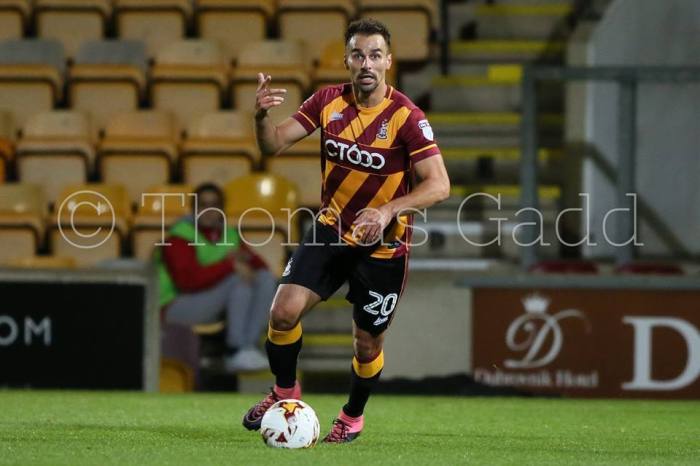By Katie Whyatt
Fleetwood at home, and a trailing Bradford City find themselves with possession on the right. Haris Vuckic twists and turns to break from his man and cuts in from the flank. Billy Clarke breaks into the box on a looping run to bring down Vuckic’s hooked ball. With only the goalkeeper to beat, Clarke backs himself to wait and glances the onrushing Filipe Morais in the corner of his eye. Morais meets the lay-off and fires home as City draw level in dramatic fashion.
It won’t go down as his most iconic finish for the club – see this one – but the fluidity of the build-up summarised what has been so striking about Bradford City in a campaign that, thus far, has exceeded every conceivable expectation. City have retained the mental grit and steel that characterised their time under Parkinson, but bonded that to a fast-flowing playing style that has unleashed a new level of dynamism. If there was apprehension about Stuart McCall’s return, the early signs are favourable, with Saturday’s 3-3 draw with Sheffield United reaffirming just how far both club and boss have come, tactically and mentally.
When he speaks, McCall already appears markedly stronger than he did during his first spell, blessed with a perspective that he lacked as the wholehearted rookie who spoke openly about how cripplingly he felt the pressure of managing the club that means so much to him. According to Morais, McCall’s relaxed demeanour extends to life on the training ground.
“Everyone’s buzzing, everyone’s enjoying it, and it’s fun to be around,” he begins. “There’s a real competitive edge in training and everyone is trying to get in the team. We do lots of technical drills and passing. It’s a lot more relaxed than under other managers that I’ve had, right throughout my career. He’s completely different to every manager I’ve had. It’s another manager that you can learn from as a player and it’s been good in that sense.
“He doesn’t really speak to players individually – he’s just quite relaxed and open with all the players in terms of when he addresses the group, but in terms of individuals, he doesn’t really speak to you individually or anything like that – there’s no certain man management or anything like that.
“He does like the players to play with freedom, and that’s great, especially for attacking players. You know you can try things and you have that freedom to express yourself, and he’s not going to get angry if you make a mistake. Sometimes, it doesn’t come off, and, as a player, if you’re scared to do certain things, you end up not fulfilling what you can do anyway. He just says, ‘Go again and be positive.’ He likes people to be positive, so that’s a great aspect when you do play. You can be expansive and try things and when you have that sort of feeling, it usually comes off as well, because you’re not worried about doing it.”
If that lack of attacking inhibition has proven a notable hallmark, the side’s finely tuned link-up play and seamless interchanging has been equally staggering, McCall’s sides continually looking well drilled and coherent despite the offensive freedom he grants them. Does that happen instinctively and naturally, or does it have to be coached?
“We’re not coached to do that, but the way the gaffer wants us to play in terms of our freedom – that allows us to do that,” Morais explains. “Because I think back to the Shrewsbury game, the last one I started – in that game, we had a lot of interchanging positions, first half. I think I ended up in the striker position quite a lot, sometimes picking the ball up quite deep off the defence. For opposition teams, it must be really hard to deal with, and it is – I’ve played against teams that have that sort of rotation. It doesn’t come from the tactical – it comes from the players.
“We’re given that license and then it’s up to us to go and do it. The players are enjoying that freedom to go and be able to interchange and get forward, and that’s what I thrive on – getting in the box and trying to score goals from midfield.”
If this is City’s most flexible side of recent years, it ranks also as their most competitive. Wholesale formation changes repeatedly accompany vast personnel changes. The side persistently reincorporate a rotating cast of players right across the park. Morais partnered James Hanson last season during City’s 4-0 win over Walsall, but acknowledges “we’re blessed with so many players that can play in that position as well.”
“It’s like any of the positions I can play – I can play left, right, or behind the striker,” he explains. “I can play three positions in the team and I’m not in the team! It’s tough with the squad that we’ve got but all I can do is keep doing what I’m doing.
“The manager doesn’t really give you an explanation [as to why players are not in the team]. He just names the team and that’s it. For me personally, I just get on with it and just try and keep proving him wrong. I think when I’ve started, I’ve shown him what I can do. Off the bench, it’s always difficult to produce when you’re coming into a heated game, but I’m very confident that when I start, I’m as good or better than anyone in the team.
“At the end of the day, we all know the manager makes the decisions and we’ve just got to accept them, keep working hard and keep trying to prove him wrong. When I’ve played, and we’ve won, or I’ve scored – that’s all I can do. Keep producing when called upon.”
Determination and unity override any potential frustration. As the Bantams upped the ante in the second half against Southend, Morais was bellowing instructions from the sidelines – which passes were on, where the options were. He’d fetch the ball as it hit the hoardings, casting himself as City’s ball boy off the pitch when he couldn’t be the ball player on it. If you’re a fan of symbolism, McCall had done the same thing two weeks earlier.
“Yeah, yeah – I get so into it,” Morais laughs. “I always want us to win, you know – I’m not one of those players who doesn’t want the team to do well when they’re not playing. I love it here. I think everyone knows how much I enjoy it, how much I love it at the club. The last game, Sheff U, the derby – I was itching it get on. Same with the Bolton game – the big games, unfortunately, I haven’t got on. It’s quite hard when you’re on the bench, mentally, to keep motivating yourself – but I’m playing for a club that I really like. I always keep that and I can take confidence from that.”
With bright starts come rapidly rising expectations. City are among the pack’s early leaders, five points from the summit. There can be no let-up – they’re only 15 games into a season of 46 – but, for all the cautious guardedness that dominated the fans’ discourse during the close season, the objective is clear inside the camp.
“If we don’t get promotion, personally, I would see it as a failure. I don’t feel any pressure in saying we’re good enough.”
“As a team, we’ve not sat down and gone, “We want to get promoted, we have to get promoted,” but individually, everyone wants that,” Morais says. “If we don’t get promotion, personally, I would see it as a failure. With the squad we’ve got, we should be in the top two, top six, minimum.
“I don’t see it as pressure – I just see it as that’s a good thing to have, because you need to push yourself to keep your standards and keep winning games. I thrive off that and I think that other players do, so that is the target. We’re not shouting and screaming and everything in the papers about it, but I’m happy to say it myself because I don’t feel any pressure in saying it.”
Back in the summer, Morais and Meredith were the first to publically endorse McCall’s methods, and Morais should know a good manager when he sees one – he spent two years under the guidance of Jose Mourinho at Chelsea. Morais was in and around the first team during Mourinho’s first stint there, training daily with Arjen Robben, John Terry. Morais featured in Mourinho’s first English game, against Oxford. The story goes that Mourinho offered Morais a twelve-month contract extension in 2006, but Morais opted instead for a free transfer to Millwall, anticipating a quick ticket back to the top flight.
“At the time, I was very… I’ve always been a confident person, but I was probably over-confident when I was younger and really didn’t understand much of the game,” he reflects. “I thought I could have… I don’t know. I probably made the wrong decision at the time. I should have taken another year at Chelsea and then maybe gone on loan, but I was fed up with playing reserve team football.
“I’d been playing reserves since I was 17, which was really early, and I just got fed up of it after going on loan to MK Dons, and coming back. I felt like I deserved a chance in the first team. In pre-season and stuff, I was involved, but I never got a Premier League game – and at the time, I was just frustrated. I thought I needed to leave the club and then come back to another Premier League team, but it just didn’t work out like that. I quickly found out that when I left Chelsea, that it’s a lot harder out there in the real world and in the lower divisions, and I kind of learned the hard way.”
Almost a decade later, via a route encompassing clubs as far-flung as Inverness and St. Johnstone, Morais would find himself back at Stamford Bridge, slotting City’s equaliser past Petr Cech in the 75th minute. “[Mourinho’s] a really genuine, nice guy,” Morais says. “Even when we played in that FA Cup game – he took time speaking with me and asked how the family were.
“He’s a fantastic motivator, a great speaker, a lovely person off the pitch. I can’t speak any higher of him and how good he was for me.
“A lot of the sessions and stuff he did with me – I still remember and use now if ever I’m coaching. It’s things I pass onto the kids, all that knowledge and the wise words he gave me.
“He’d always say, as a winger, in the middle third, always keep it simple; in the final third, go and express yourself and be positive. He hated it in the middle third or in your own third, your own defensive third, if wingers were trying to take people on and putting the ball at risk. He would always say that, don’t put the ball at risk. And to this day, I think everyone knows the sort of manager Jose is. He’s not defence-minded, but he just doesn’t like putting the ball at risk, and I wouldn’t say he’s an expansive manager, like Brendan Rodgers or Pep Guardiola.
“That’s his style, and I always remember that. I always remember as well, work-rate – he’d always demand a huge work-rate from his wingers, which was different to other managers, where the wingers sometimes backed off or whatever. He demanded a very high work-ethic, every day in training, and in games from his wingers, and everyone in the team.
“John Terry was brilliant with the young lads. He always gave great advice and he was brilliant for me. Robben was fantastic for me because still to this day I think he’s one of the best wingers of all time. He was just phenomenal – he had unfortunately quite a lot of injuries at Chelsea, but he’s someone I learned a lot from, and I used to train a lot with him individually. It was just phenomenal – the pace his feet could move at, dribbling, was just unbelievable, and his end product was fantastic.”
His time under Mourinho, at Chelsea, has informed his own coaching philosophy. Morais set up M Professional Football Academy this year, and will personally coach players aged 11-16. The trials took place this week. Outwardly, its footballing ethos reflects his playing style, and the principles of attitude, work ethic and confidence will be central as he aims to produce players comfortable on the ball and able to use both feet. He jokes he’s “lost many summer holidays” while he works towards his UEFA B license, spending time in Portugal to watch Sporting Lisbon and Benfica’s academies.
“[We want] players to take touches, manipulate the ball in tight areas and not be afraid to take the ball under pressure,” he says. “Confident, but not arrogant. [We want them to] push themselves to improve, and never waste a minute or go through the motions.”
Sound familiar?
The third episode of the WOAP Podcast is now available – click here for more.
___________________________________________________
Vote for us
Width of a Post is a finalist at the Football Blogging Awards, if you like what we do, please click here orhereto vote for us, or here for full details.
Categories: Interviews



I think of Fil in the same way as Jamie Lawrence, in the sense of once he retires you can see him coming back here to watch games now he’s a lover of our club.
A great player on his day and im sure he will start to make an impact like he did before the injury.
So glad he’s our player and we don’t have to play against him
Such a great person to have around.
I think he needs to lose a little bit of weight and get some speed back though
Top guy and I really hope he gets a run in the team. He was playing well before the injuries and with the new freedom and improved technical coaching I think he cud play a massive role in any success we may have. I expected McCall to be more of a man manager from the outside (especially with the story about Marshall).
Interesting read.